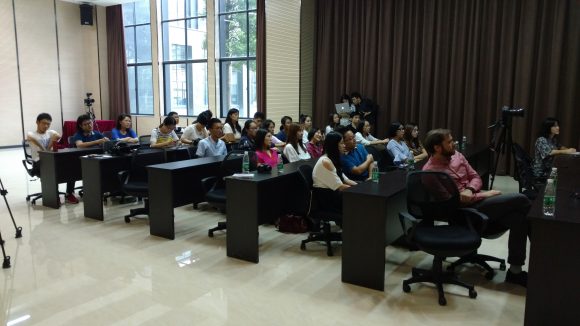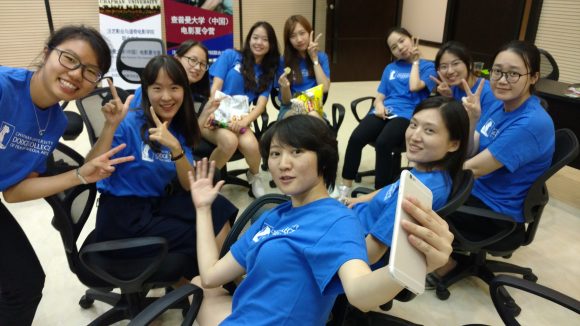Teaching filmmaking in China: Dodge launches Summer Film Academy in Shenzhen
January 3, 2017
Although companies the world over seek a foothold in China, in many ways it’s easier said than done. Cultural and language differences are just the starting point of challenges to be surmounted for Americans working in China.
For Dodge College faculty, the launch of the first Summer Film Academy in Shenzhen, China, was not without these challenges, and some new ones, such as students rescheduling their shoots around a typhoon. But the outcomes were terrific—satisfied students, good films and a great foundation for future forays into the country where box office receipts will soon surpass those in the U.S.
The program attracted media attention from major Chinese online, newspaper and television media, and brought film industry and local government officials to the final screening. Several of the student participants now plan to apply to Chapman, says Kim Zheng, president of Artention Films, a film financing and production company that hosted the program in Shenzhen.
Fifteen students—from Beijing, Shenzhen, and even one from Mongolia—joined Chapman faculty Harry Cheney and Tom Ptansinski and two graduate students for the first Chapman program in China. Modeled on Chapman’s highly successful Summer Film Academy, now in its 6
th
year, the two-week program took students through the entire filmmaking process as they created three films during the session.

Although none of the students had previous filmmaking experience, Cheney found them prepared in other important ways. “They were not only familiar with classic Western literature and music in addition to stories from their own culture, they attempted to use this knowledge in their films,” he says. “In fact, out of the three final films, the most successful one was based on a Chinese folk tale.”
Cheney also found the students in some ways more independent and more disciplined that their American high school counterparts. He even brought back a shot list prepared by one of his Chinese students to use as an example in his classes in Orange. “I don’t think even our senior filmmakers are so detailed with their paperwork,” he says.
“Most of them didn’t have any film experience but caught on instantly to the intricacies of filming and editing,” Cheney continues. “They don’t seem to have extensive film education in their schools but they do teach them philosophy, literature, music which gives them a better background for being good storytellers than their American counterparts who are immersed in media.” Yet, just like students in the U.S., when given notes on their projects, “if they didn’t agree, they would simply ignore us and do it their own way!”
The classes were conducted in English, as the students were pretty fluent, with the occasional assist by two Chinese Chapman students who went as graduate assistants: Dingxuan Huang, ‘18, a cinematographer, who is from Shenzhen himself, and Bingjie Huang, an editor, is from Wuhan, China. Both found the students eager to learn. “Most important,” says Dingxuan, “they will know whether they like filmmaking for not and which crew positions they like the most.”

The program concluded with a final screening, greeted enthusiastically by family and friends, including a well-known film critic and famous Chinese director, Lu Xiaoya.
Bottom line?
Cheney characterizes the students as “utterly charming and intelligent and capable of working on their own.” Virtually any of them, he reports, “would excel in our film program here.”
For Ptasinski, the experience validated the premise that has driven the Summer Film Academy in Orange. “In the past,” he says, “when Harry or I would discuss the success we’ve had teaching a story-centric program and how it seemed like a universal way to teach film we’d get a polite chuckle since there was no way to prove our program’s premise outside of America… until now.
“If anything, my time in China reaffirmed to me that cinema is, now more than ever, a universal art form.”
EDITOR’S NOTE: This article originally appeared in the Fall 2016 issue of In Production. Read other great articles, and catch up on older issues, by clicking here.


